Public Affairs Essay: Lobbying Codes, Power, and Public Good (ALR782)
VerifiedAdded on 2022/09/15
|8
|2034
|12
Essay
AI Summary
This essay critically examines the effectiveness of current Australian lobbying codes of conduct and registers, arguing that they may not adequately regulate lobbying due to societal power imbalances and the need to prioritize the public good over vested interests. The analysis draws upon relevant resources from topics 1-3 and utilizes case studies of the alcohol industry, referencing research by Miller and Harkins (2010) and Mathews, Thorn, and Giorgi (2013). The essay explores the role of lobbyists, their connections to government, and the potential risks associated with the 'revolving door' phenomenon. Furthermore, it incorporates at least one theory of public opinion formation to shed light on the public response and advocate for a stronger regulatory framework. The essay highlights the importance of transparency, integrity, and ethical considerations within the realm of public affairs, emphasizing the need for a robust system that safeguards the public interest against undue influence from powerful lobby groups.
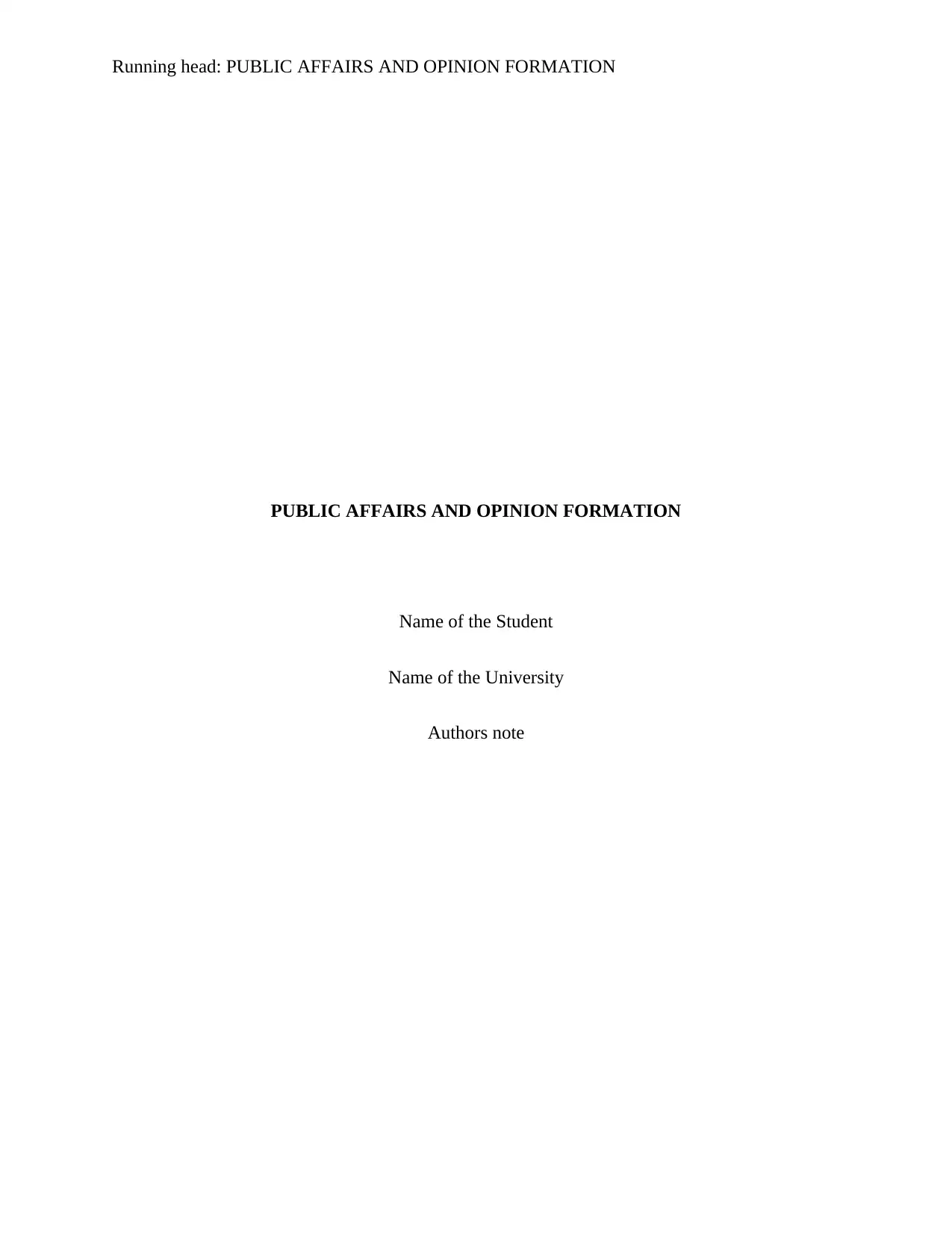
Running head: PUBLIC AFFAIRS AND OPINION FORMATION
PUBLIC AFFAIRS AND OPINION FORMATION
Name of the Student
Name of the University
Authors note
PUBLIC AFFAIRS AND OPINION FORMATION
Name of the Student
Name of the University
Authors note
Paraphrase This Document
Need a fresh take? Get an instant paraphrase of this document with our AI Paraphraser
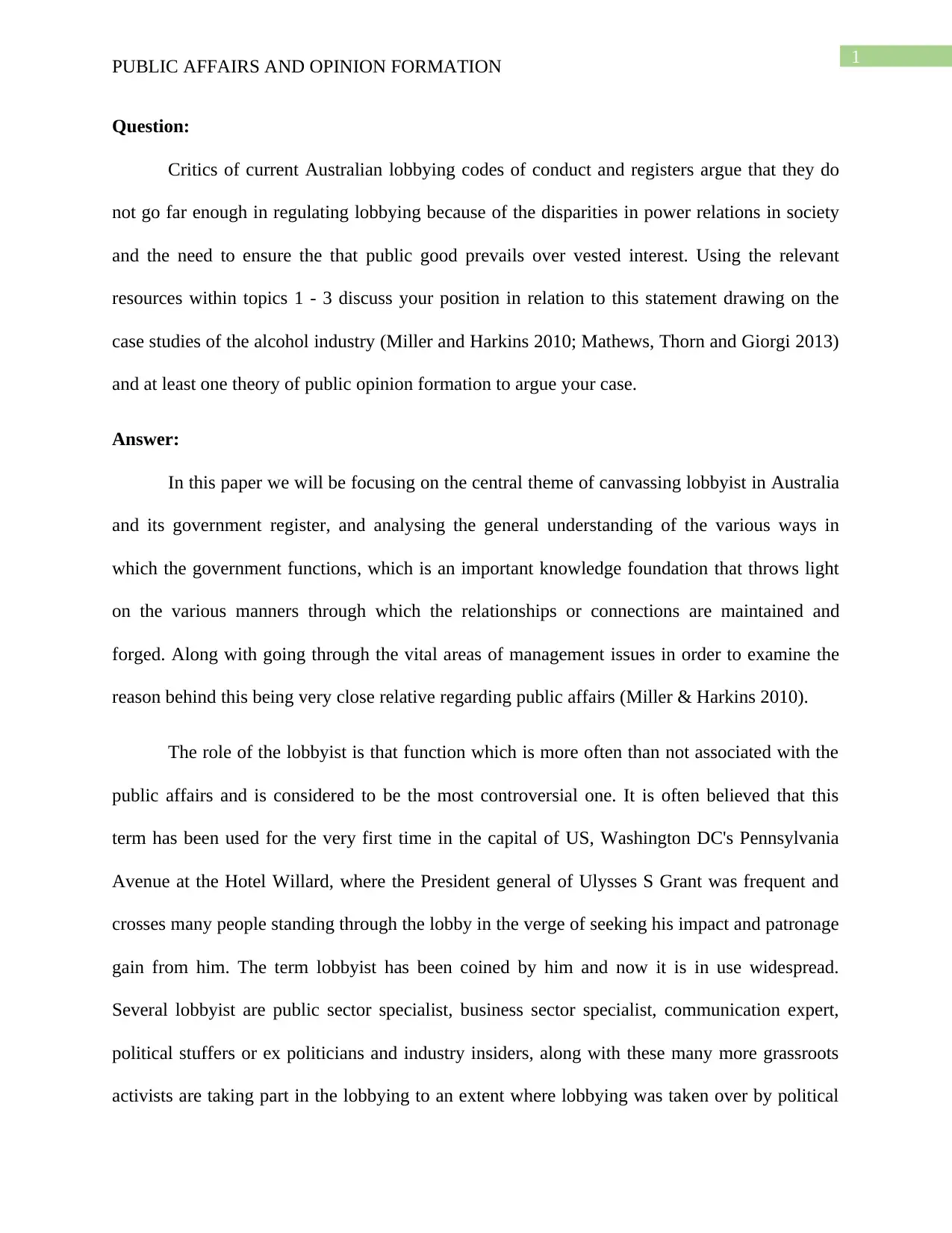
1
PUBLIC AFFAIRS AND OPINION FORMATION
Question:
Critics of current Australian lobbying codes of conduct and registers argue that they do
not go far enough in regulating lobbying because of the disparities in power relations in society
and the need to ensure the that public good prevails over vested interest. Using the relevant
resources within topics 1 - 3 discuss your position in relation to this statement drawing on the
case studies of the alcohol industry (Miller and Harkins 2010; Mathews, Thorn and Giorgi 2013)
and at least one theory of public opinion formation to argue your case.
Answer:
In this paper we will be focusing on the central theme of canvassing lobbyist in Australia
and its government register, and analysing the general understanding of the various ways in
which the government functions, which is an important knowledge foundation that throws light
on the various manners through which the relationships or connections are maintained and
forged. Along with going through the vital areas of management issues in order to examine the
reason behind this being very close relative regarding public affairs (Miller & Harkins 2010).
The role of the lobbyist is that function which is more often than not associated with the
public affairs and is considered to be the most controversial one. It is often believed that this
term has been used for the very first time in the capital of US, Washington DC's Pennsylvania
Avenue at the Hotel Willard, where the President general of Ulysses S Grant was frequent and
crosses many people standing through the lobby in the verge of seeking his impact and patronage
gain from him. The term lobbyist has been coined by him and now it is in use widespread.
Several lobbyist are public sector specialist, business sector specialist, communication expert,
political stuffers or ex politicians and industry insiders, along with these many more grassroots
activists are taking part in the lobbying to an extent where lobbying was taken over by political
PUBLIC AFFAIRS AND OPINION FORMATION
Question:
Critics of current Australian lobbying codes of conduct and registers argue that they do
not go far enough in regulating lobbying because of the disparities in power relations in society
and the need to ensure the that public good prevails over vested interest. Using the relevant
resources within topics 1 - 3 discuss your position in relation to this statement drawing on the
case studies of the alcohol industry (Miller and Harkins 2010; Mathews, Thorn and Giorgi 2013)
and at least one theory of public opinion formation to argue your case.
Answer:
In this paper we will be focusing on the central theme of canvassing lobbyist in Australia
and its government register, and analysing the general understanding of the various ways in
which the government functions, which is an important knowledge foundation that throws light
on the various manners through which the relationships or connections are maintained and
forged. Along with going through the vital areas of management issues in order to examine the
reason behind this being very close relative regarding public affairs (Miller & Harkins 2010).
The role of the lobbyist is that function which is more often than not associated with the
public affairs and is considered to be the most controversial one. It is often believed that this
term has been used for the very first time in the capital of US, Washington DC's Pennsylvania
Avenue at the Hotel Willard, where the President general of Ulysses S Grant was frequent and
crosses many people standing through the lobby in the verge of seeking his impact and patronage
gain from him. The term lobbyist has been coined by him and now it is in use widespread.
Several lobbyist are public sector specialist, business sector specialist, communication expert,
political stuffers or ex politicians and industry insiders, along with these many more grassroots
activists are taking part in the lobbying to an extent where lobbying was taken over by political
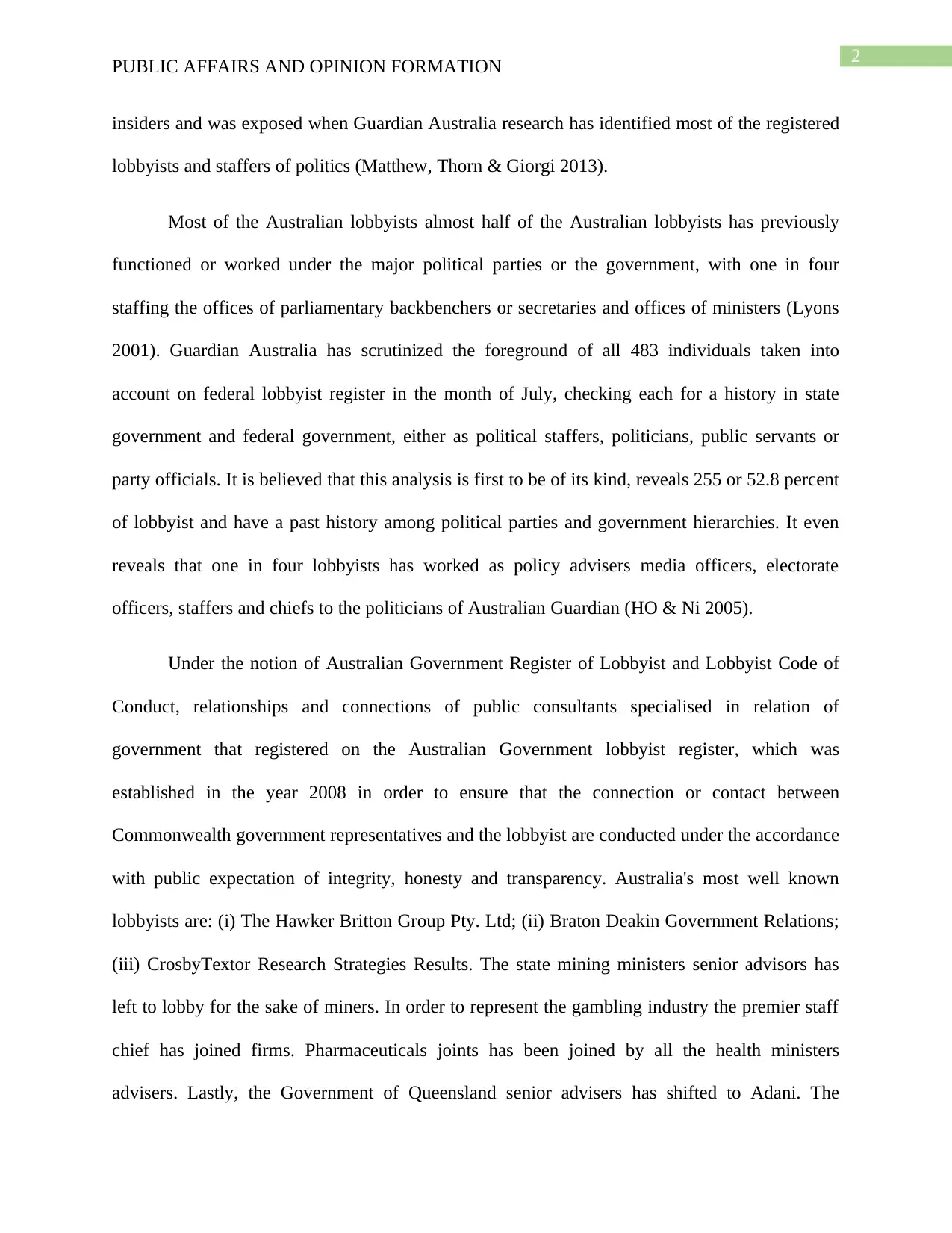
2
PUBLIC AFFAIRS AND OPINION FORMATION
insiders and was exposed when Guardian Australia research has identified most of the registered
lobbyists and staffers of politics (Matthew, Thorn & Giorgi 2013).
Most of the Australian lobbyists almost half of the Australian lobbyists has previously
functioned or worked under the major political parties or the government, with one in four
staffing the offices of parliamentary backbenchers or secretaries and offices of ministers (Lyons
2001). Guardian Australia has scrutinized the foreground of all 483 individuals taken into
account on federal lobbyist register in the month of July, checking each for a history in state
government and federal government, either as political staffers, politicians, public servants or
party officials. It is believed that this analysis is first to be of its kind, reveals 255 or 52.8 percent
of lobbyist and have a past history among political parties and government hierarchies. It even
reveals that one in four lobbyists has worked as policy advisers media officers, electorate
officers, staffers and chiefs to the politicians of Australian Guardian (HO & Ni 2005).
Under the notion of Australian Government Register of Lobbyist and Lobbyist Code of
Conduct, relationships and connections of public consultants specialised in relation of
government that registered on the Australian Government lobbyist register, which was
established in the year 2008 in order to ensure that the connection or contact between
Commonwealth government representatives and the lobbyist are conducted under the accordance
with public expectation of integrity, honesty and transparency. Australia's most well known
lobbyists are: (i) The Hawker Britton Group Pty. Ltd; (ii) Braton Deakin Government Relations;
(iii) CrosbyTextor Research Strategies Results. The state mining ministers senior advisors has
left to lobby for the sake of miners. In order to represent the gambling industry the premier staff
chief has joined firms. Pharmaceuticals joints has been joined by all the health ministers
advisers. Lastly, the Government of Queensland senior advisers has shifted to Adani. The
PUBLIC AFFAIRS AND OPINION FORMATION
insiders and was exposed when Guardian Australia research has identified most of the registered
lobbyists and staffers of politics (Matthew, Thorn & Giorgi 2013).
Most of the Australian lobbyists almost half of the Australian lobbyists has previously
functioned or worked under the major political parties or the government, with one in four
staffing the offices of parliamentary backbenchers or secretaries and offices of ministers (Lyons
2001). Guardian Australia has scrutinized the foreground of all 483 individuals taken into
account on federal lobbyist register in the month of July, checking each for a history in state
government and federal government, either as political staffers, politicians, public servants or
party officials. It is believed that this analysis is first to be of its kind, reveals 255 or 52.8 percent
of lobbyist and have a past history among political parties and government hierarchies. It even
reveals that one in four lobbyists has worked as policy advisers media officers, electorate
officers, staffers and chiefs to the politicians of Australian Guardian (HO & Ni 2005).
Under the notion of Australian Government Register of Lobbyist and Lobbyist Code of
Conduct, relationships and connections of public consultants specialised in relation of
government that registered on the Australian Government lobbyist register, which was
established in the year 2008 in order to ensure that the connection or contact between
Commonwealth government representatives and the lobbyist are conducted under the accordance
with public expectation of integrity, honesty and transparency. Australia's most well known
lobbyists are: (i) The Hawker Britton Group Pty. Ltd; (ii) Braton Deakin Government Relations;
(iii) CrosbyTextor Research Strategies Results. The state mining ministers senior advisors has
left to lobby for the sake of miners. In order to represent the gambling industry the premier staff
chief has joined firms. Pharmaceuticals joints has been joined by all the health ministers
advisers. Lastly, the Government of Queensland senior advisers has shifted to Adani. The
⊘ This is a preview!⊘
Do you want full access?
Subscribe today to unlock all pages.

Trusted by 1+ million students worldwide
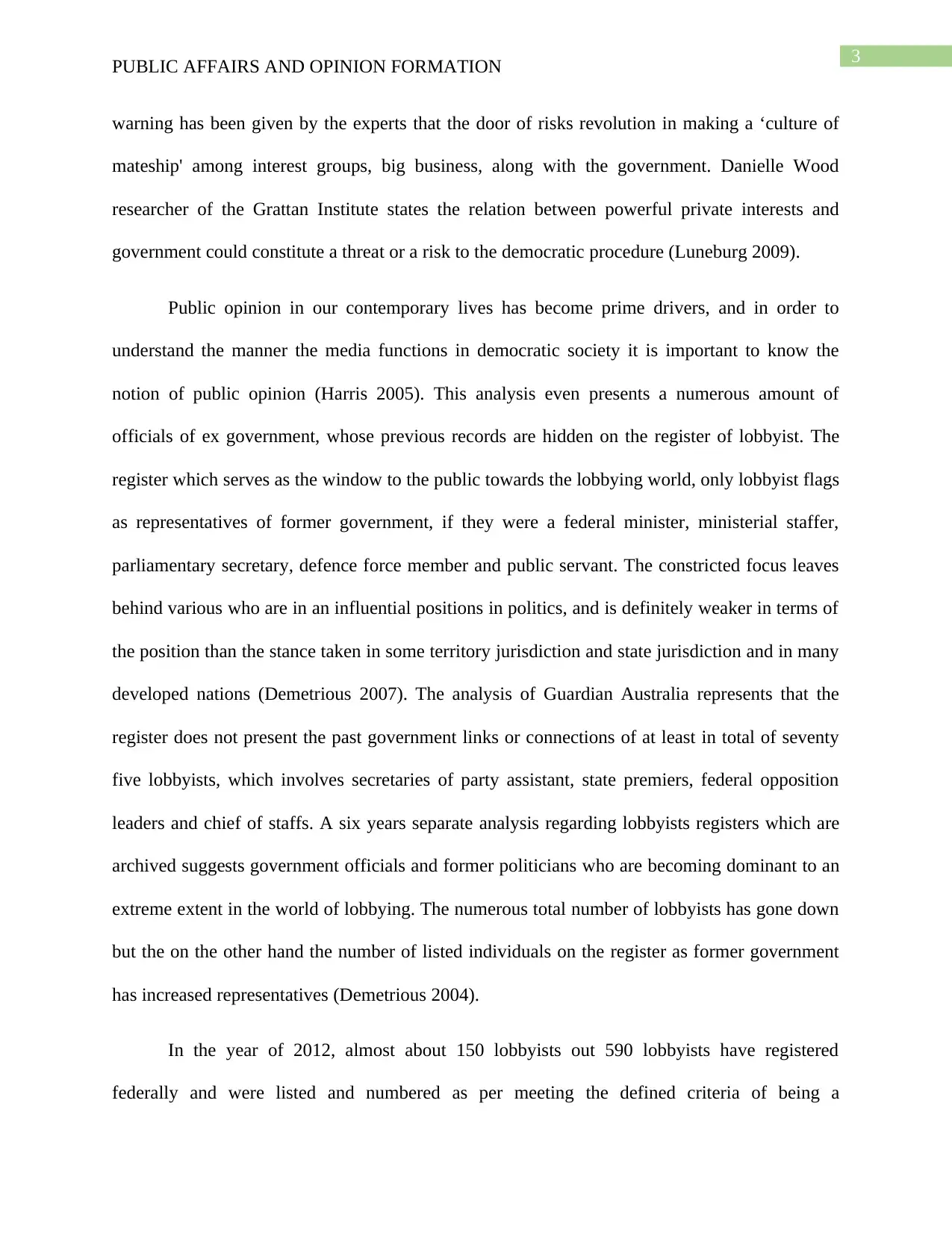
3
PUBLIC AFFAIRS AND OPINION FORMATION
warning has been given by the experts that the door of risks revolution in making a ‘culture of
mateship' among interest groups, big business, along with the government. Danielle Wood
researcher of the Grattan Institute states the relation between powerful private interests and
government could constitute a threat or a risk to the democratic procedure (Luneburg 2009).
Public opinion in our contemporary lives has become prime drivers, and in order to
understand the manner the media functions in democratic society it is important to know the
notion of public opinion (Harris 2005). This analysis even presents a numerous amount of
officials of ex government, whose previous records are hidden on the register of lobbyist. The
register which serves as the window to the public towards the lobbying world, only lobbyist flags
as representatives of former government, if they were a federal minister, ministerial staffer,
parliamentary secretary, defence force member and public servant. The constricted focus leaves
behind various who are in an influential positions in politics, and is definitely weaker in terms of
the position than the stance taken in some territory jurisdiction and state jurisdiction and in many
developed nations (Demetrious 2007). The analysis of Guardian Australia represents that the
register does not present the past government links or connections of at least in total of seventy
five lobbyists, which involves secretaries of party assistant, state premiers, federal opposition
leaders and chief of staffs. A six years separate analysis regarding lobbyists registers which are
archived suggests government officials and former politicians who are becoming dominant to an
extreme extent in the world of lobbying. The numerous total number of lobbyists has gone down
but the on the other hand the number of listed individuals on the register as former government
has increased representatives (Demetrious 2004).
In the year of 2012, almost about 150 lobbyists out 590 lobbyists have registered
federally and were listed and numbered as per meeting the defined criteria of being a
PUBLIC AFFAIRS AND OPINION FORMATION
warning has been given by the experts that the door of risks revolution in making a ‘culture of
mateship' among interest groups, big business, along with the government. Danielle Wood
researcher of the Grattan Institute states the relation between powerful private interests and
government could constitute a threat or a risk to the democratic procedure (Luneburg 2009).
Public opinion in our contemporary lives has become prime drivers, and in order to
understand the manner the media functions in democratic society it is important to know the
notion of public opinion (Harris 2005). This analysis even presents a numerous amount of
officials of ex government, whose previous records are hidden on the register of lobbyist. The
register which serves as the window to the public towards the lobbying world, only lobbyist flags
as representatives of former government, if they were a federal minister, ministerial staffer,
parliamentary secretary, defence force member and public servant. The constricted focus leaves
behind various who are in an influential positions in politics, and is definitely weaker in terms of
the position than the stance taken in some territory jurisdiction and state jurisdiction and in many
developed nations (Demetrious 2007). The analysis of Guardian Australia represents that the
register does not present the past government links or connections of at least in total of seventy
five lobbyists, which involves secretaries of party assistant, state premiers, federal opposition
leaders and chief of staffs. A six years separate analysis regarding lobbyists registers which are
archived suggests government officials and former politicians who are becoming dominant to an
extreme extent in the world of lobbying. The numerous total number of lobbyists has gone down
but the on the other hand the number of listed individuals on the register as former government
has increased representatives (Demetrious 2004).
In the year of 2012, almost about 150 lobbyists out 590 lobbyists have registered
federally and were listed and numbered as per meeting the defined criteria of being a
Paraphrase This Document
Need a fresh take? Get an instant paraphrase of this document with our AI Paraphraser
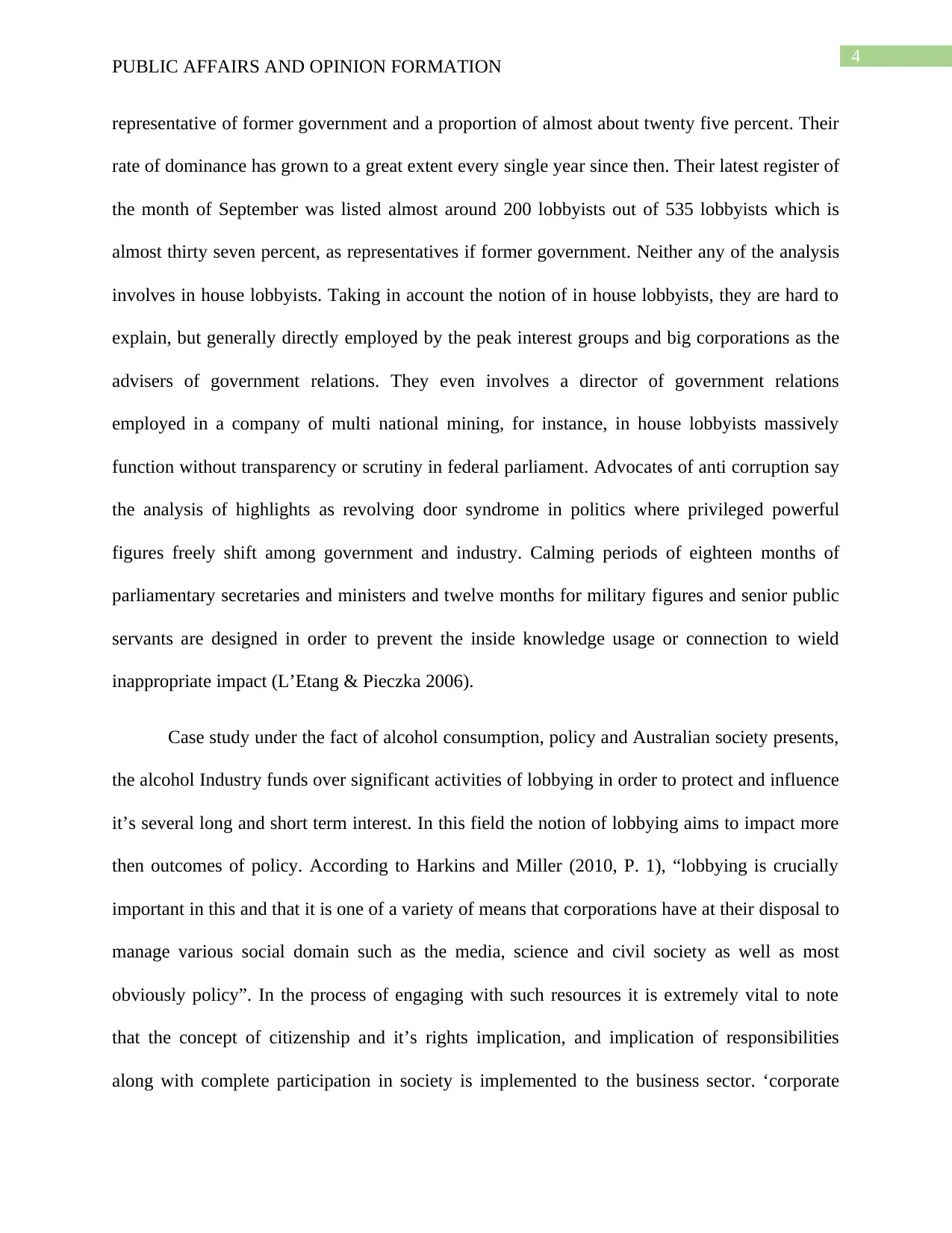
4
PUBLIC AFFAIRS AND OPINION FORMATION
representative of former government and a proportion of almost about twenty five percent. Their
rate of dominance has grown to a great extent every single year since then. Their latest register of
the month of September was listed almost around 200 lobbyists out of 535 lobbyists which is
almost thirty seven percent, as representatives if former government. Neither any of the analysis
involves in house lobbyists. Taking in account the notion of in house lobbyists, they are hard to
explain, but generally directly employed by the peak interest groups and big corporations as the
advisers of government relations. They even involves a director of government relations
employed in a company of multi national mining, for instance, in house lobbyists massively
function without transparency or scrutiny in federal parliament. Advocates of anti corruption say
the analysis of highlights as revolving door syndrome in politics where privileged powerful
figures freely shift among government and industry. Calming periods of eighteen months of
parliamentary secretaries and ministers and twelve months for military figures and senior public
servants are designed in order to prevent the inside knowledge usage or connection to wield
inappropriate impact (L’Etang & Pieczka 2006).
Case study under the fact of alcohol consumption, policy and Australian society presents,
the alcohol Industry funds over significant activities of lobbying in order to protect and influence
it’s several long and short term interest. In this field the notion of lobbying aims to impact more
then outcomes of policy. According to Harkins and Miller (2010, P. 1), “lobbying is crucially
important in this and that it is one of a variety of means that corporations have at their disposal to
manage various social domain such as the media, science and civil society as well as most
obviously policy”. In the process of engaging with such resources it is extremely vital to note
that the concept of citizenship and it’s rights implication, and implication of responsibilities
along with complete participation in society is implemented to the business sector. ‘corporate
PUBLIC AFFAIRS AND OPINION FORMATION
representative of former government and a proportion of almost about twenty five percent. Their
rate of dominance has grown to a great extent every single year since then. Their latest register of
the month of September was listed almost around 200 lobbyists out of 535 lobbyists which is
almost thirty seven percent, as representatives if former government. Neither any of the analysis
involves in house lobbyists. Taking in account the notion of in house lobbyists, they are hard to
explain, but generally directly employed by the peak interest groups and big corporations as the
advisers of government relations. They even involves a director of government relations
employed in a company of multi national mining, for instance, in house lobbyists massively
function without transparency or scrutiny in federal parliament. Advocates of anti corruption say
the analysis of highlights as revolving door syndrome in politics where privileged powerful
figures freely shift among government and industry. Calming periods of eighteen months of
parliamentary secretaries and ministers and twelve months for military figures and senior public
servants are designed in order to prevent the inside knowledge usage or connection to wield
inappropriate impact (L’Etang & Pieczka 2006).
Case study under the fact of alcohol consumption, policy and Australian society presents,
the alcohol Industry funds over significant activities of lobbying in order to protect and influence
it’s several long and short term interest. In this field the notion of lobbying aims to impact more
then outcomes of policy. According to Harkins and Miller (2010, P. 1), “lobbying is crucially
important in this and that it is one of a variety of means that corporations have at their disposal to
manage various social domain such as the media, science and civil society as well as most
obviously policy”. In the process of engaging with such resources it is extremely vital to note
that the concept of citizenship and it’s rights implication, and implication of responsibilities
along with complete participation in society is implemented to the business sector. ‘corporate
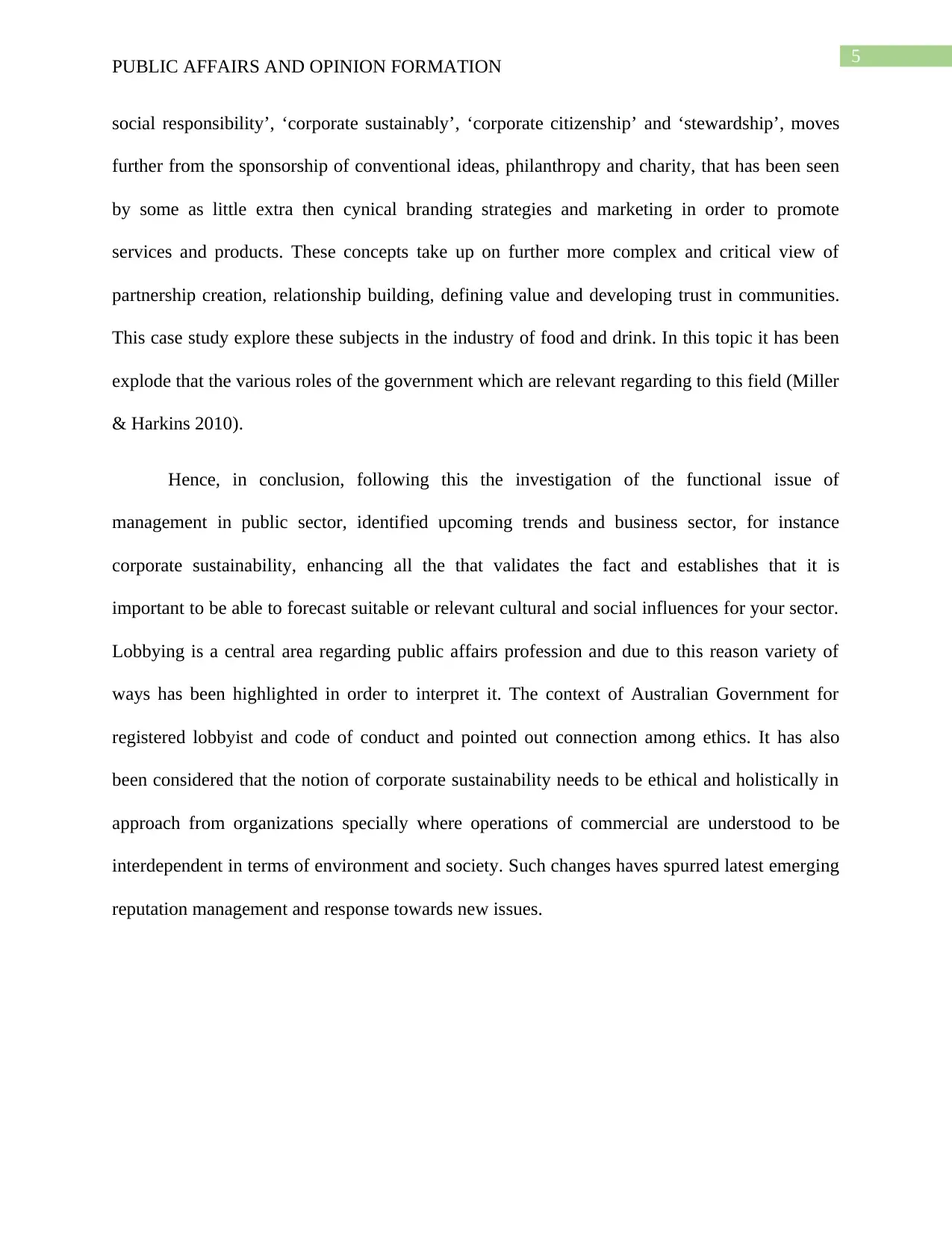
5
PUBLIC AFFAIRS AND OPINION FORMATION
social responsibility’, ‘corporate sustainably’, ‘corporate citizenship’ and ‘stewardship’, moves
further from the sponsorship of conventional ideas, philanthropy and charity, that has been seen
by some as little extra then cynical branding strategies and marketing in order to promote
services and products. These concepts take up on further more complex and critical view of
partnership creation, relationship building, defining value and developing trust in communities.
This case study explore these subjects in the industry of food and drink. In this topic it has been
explode that the various roles of the government which are relevant regarding to this field (Miller
& Harkins 2010).
Hence, in conclusion, following this the investigation of the functional issue of
management in public sector, identified upcoming trends and business sector, for instance
corporate sustainability, enhancing all the that validates the fact and establishes that it is
important to be able to forecast suitable or relevant cultural and social influences for your sector.
Lobbying is a central area regarding public affairs profession and due to this reason variety of
ways has been highlighted in order to interpret it. The context of Australian Government for
registered lobbyist and code of conduct and pointed out connection among ethics. It has also
been considered that the notion of corporate sustainability needs to be ethical and holistically in
approach from organizations specially where operations of commercial are understood to be
interdependent in terms of environment and society. Such changes haves spurred latest emerging
reputation management and response towards new issues.
PUBLIC AFFAIRS AND OPINION FORMATION
social responsibility’, ‘corporate sustainably’, ‘corporate citizenship’ and ‘stewardship’, moves
further from the sponsorship of conventional ideas, philanthropy and charity, that has been seen
by some as little extra then cynical branding strategies and marketing in order to promote
services and products. These concepts take up on further more complex and critical view of
partnership creation, relationship building, defining value and developing trust in communities.
This case study explore these subjects in the industry of food and drink. In this topic it has been
explode that the various roles of the government which are relevant regarding to this field (Miller
& Harkins 2010).
Hence, in conclusion, following this the investigation of the functional issue of
management in public sector, identified upcoming trends and business sector, for instance
corporate sustainability, enhancing all the that validates the fact and establishes that it is
important to be able to forecast suitable or relevant cultural and social influences for your sector.
Lobbying is a central area regarding public affairs profession and due to this reason variety of
ways has been highlighted in order to interpret it. The context of Australian Government for
registered lobbyist and code of conduct and pointed out connection among ethics. It has also
been considered that the notion of corporate sustainability needs to be ethical and holistically in
approach from organizations specially where operations of commercial are understood to be
interdependent in terms of environment and society. Such changes haves spurred latest emerging
reputation management and response towards new issues.
⊘ This is a preview!⊘
Do you want full access?
Subscribe today to unlock all pages.

Trusted by 1+ million students worldwide
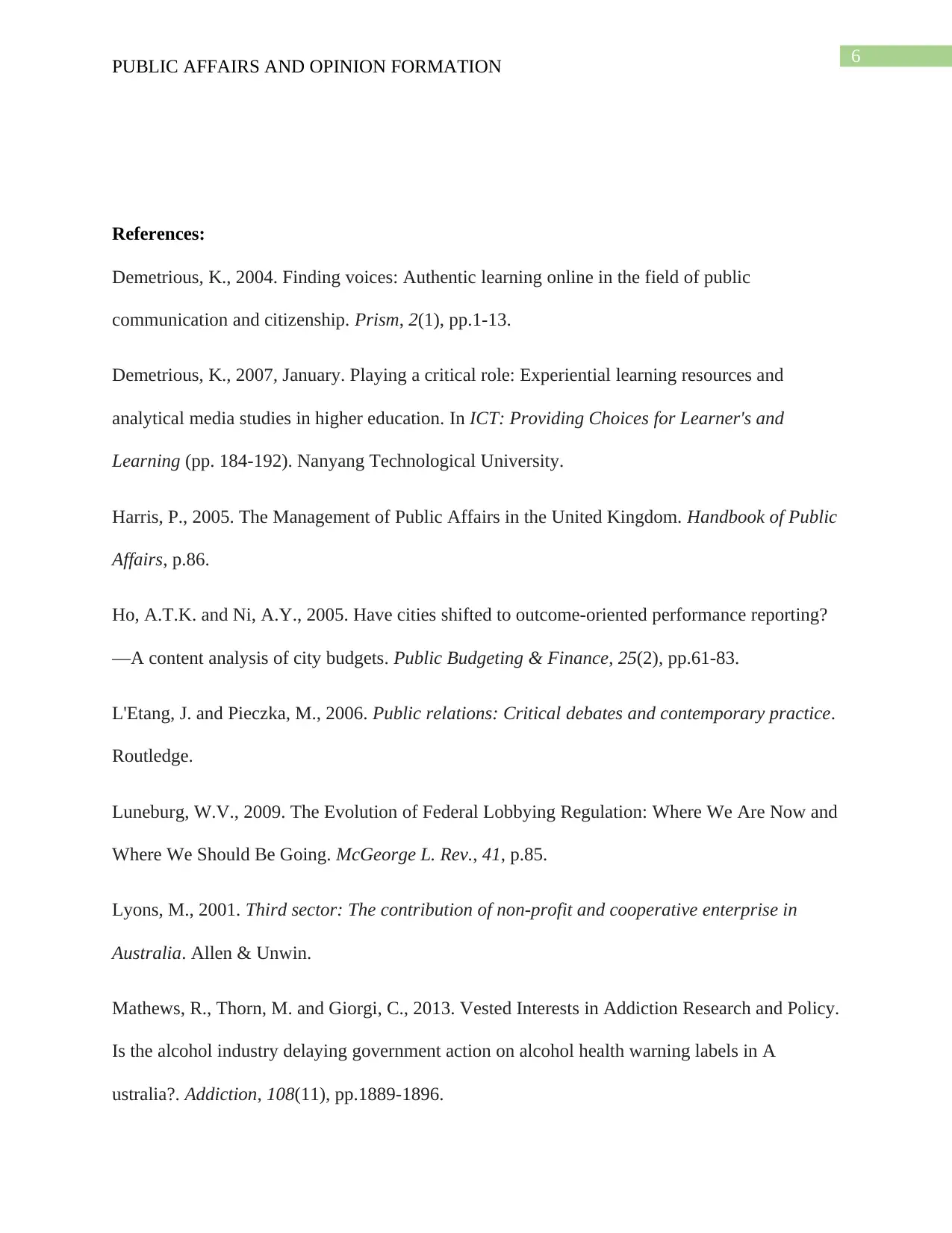
6
PUBLIC AFFAIRS AND OPINION FORMATION
References:
Demetrious, K., 2004. Finding voices: Authentic learning online in the field of public
communication and citizenship. Prism, 2(1), pp.1-13.
Demetrious, K., 2007, January. Playing a critical role: Experiential learning resources and
analytical media studies in higher education. In ICT: Providing Choices for Learner's and
Learning (pp. 184-192). Nanyang Technological University.
Harris, P., 2005. The Management of Public Affairs in the United Kingdom. Handbook of Public
Affairs, p.86.
Ho, A.T.K. and Ni, A.Y., 2005. Have cities shifted to outcome‐oriented performance reporting?
—A content analysis of city budgets. Public Budgeting & Finance, 25(2), pp.61-83.
L'Etang, J. and Pieczka, M., 2006. Public relations: Critical debates and contemporary practice.
Routledge.
Luneburg, W.V., 2009. The Evolution of Federal Lobbying Regulation: Where We Are Now and
Where We Should Be Going. McGeorge L. Rev., 41, p.85.
Lyons, M., 2001. Third sector: The contribution of non-profit and cooperative enterprise in
Australia. Allen & Unwin.
Mathews, R., Thorn, M. and Giorgi, C., 2013. Vested Interests in Addiction Research and Policy.
Is the alcohol industry delaying government action on alcohol health warning labels in A
ustralia?. Addiction, 108(11), pp.1889-1896.
PUBLIC AFFAIRS AND OPINION FORMATION
References:
Demetrious, K., 2004. Finding voices: Authentic learning online in the field of public
communication and citizenship. Prism, 2(1), pp.1-13.
Demetrious, K., 2007, January. Playing a critical role: Experiential learning resources and
analytical media studies in higher education. In ICT: Providing Choices for Learner's and
Learning (pp. 184-192). Nanyang Technological University.
Harris, P., 2005. The Management of Public Affairs in the United Kingdom. Handbook of Public
Affairs, p.86.
Ho, A.T.K. and Ni, A.Y., 2005. Have cities shifted to outcome‐oriented performance reporting?
—A content analysis of city budgets. Public Budgeting & Finance, 25(2), pp.61-83.
L'Etang, J. and Pieczka, M., 2006. Public relations: Critical debates and contemporary practice.
Routledge.
Luneburg, W.V., 2009. The Evolution of Federal Lobbying Regulation: Where We Are Now and
Where We Should Be Going. McGeorge L. Rev., 41, p.85.
Lyons, M., 2001. Third sector: The contribution of non-profit and cooperative enterprise in
Australia. Allen & Unwin.
Mathews, R., Thorn, M. and Giorgi, C., 2013. Vested Interests in Addiction Research and Policy.
Is the alcohol industry delaying government action on alcohol health warning labels in A
ustralia?. Addiction, 108(11), pp.1889-1896.
Paraphrase This Document
Need a fresh take? Get an instant paraphrase of this document with our AI Paraphraser
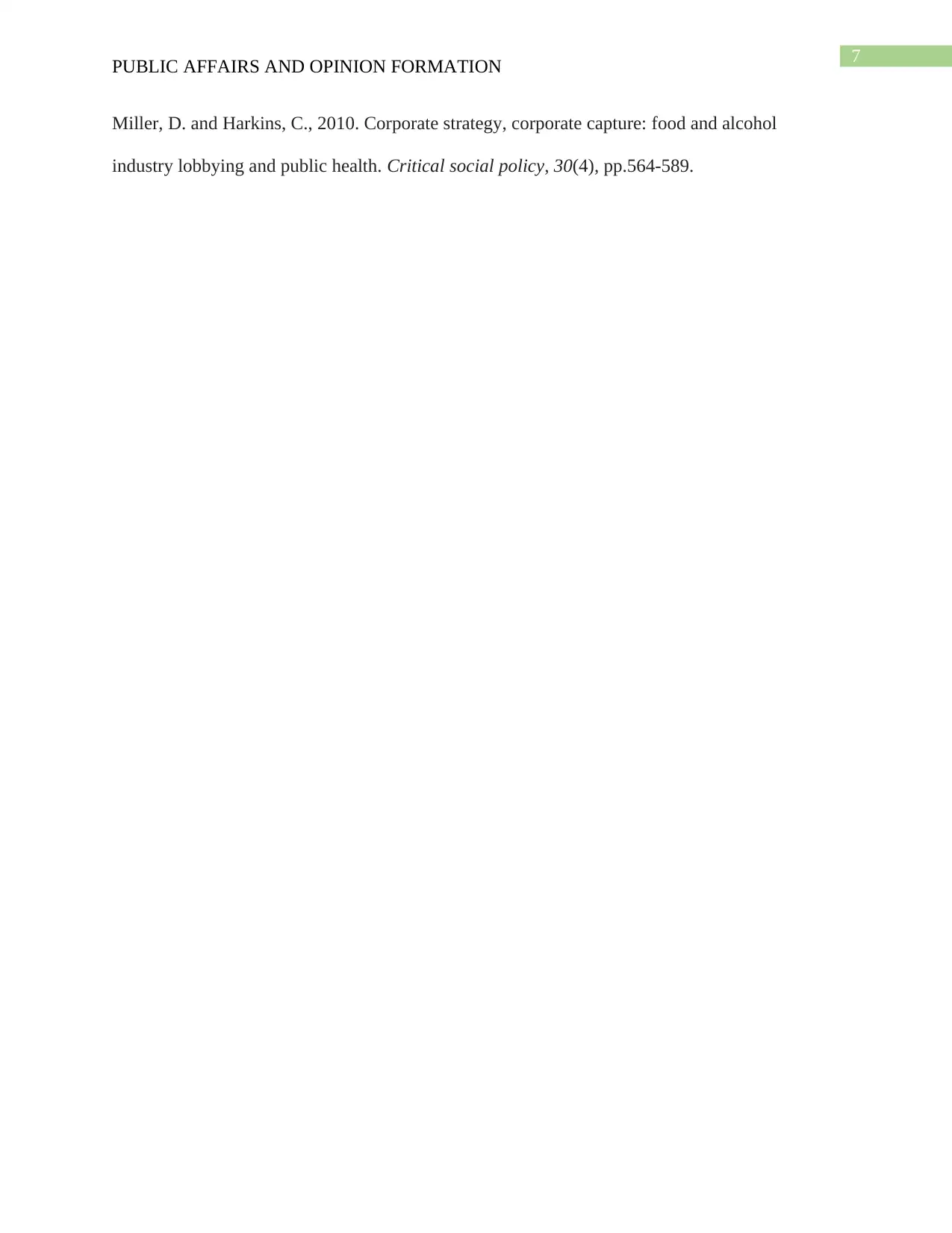
7
PUBLIC AFFAIRS AND OPINION FORMATION
Miller, D. and Harkins, C., 2010. Corporate strategy, corporate capture: food and alcohol
industry lobbying and public health. Critical social policy, 30(4), pp.564-589.
PUBLIC AFFAIRS AND OPINION FORMATION
Miller, D. and Harkins, C., 2010. Corporate strategy, corporate capture: food and alcohol
industry lobbying and public health. Critical social policy, 30(4), pp.564-589.
1 out of 8
Your All-in-One AI-Powered Toolkit for Academic Success.
+13062052269
info@desklib.com
Available 24*7 on WhatsApp / Email
![[object Object]](/_next/static/media/star-bottom.7253800d.svg)
Unlock your academic potential
Copyright © 2020–2026 A2Z Services. All Rights Reserved. Developed and managed by ZUCOL.